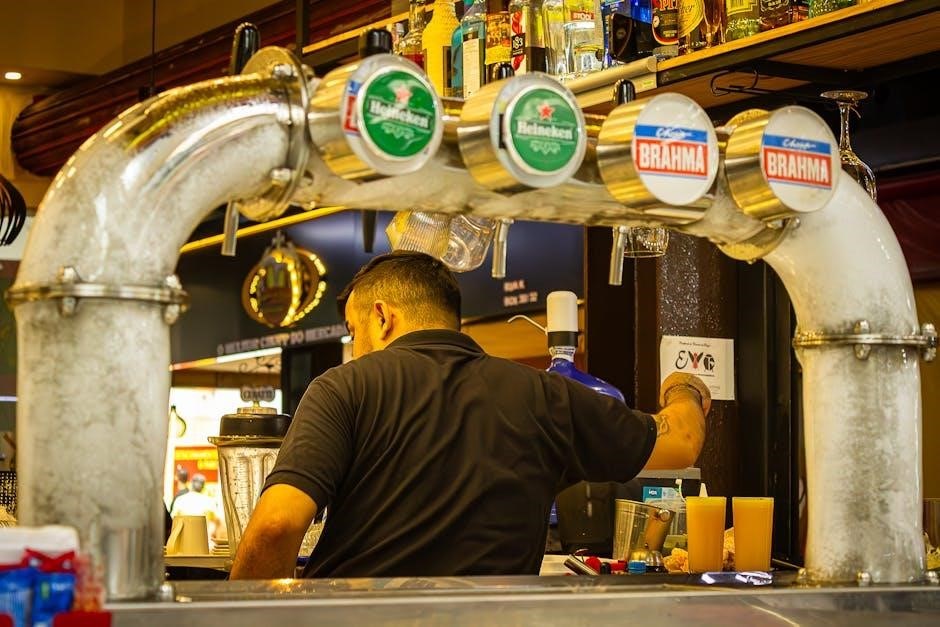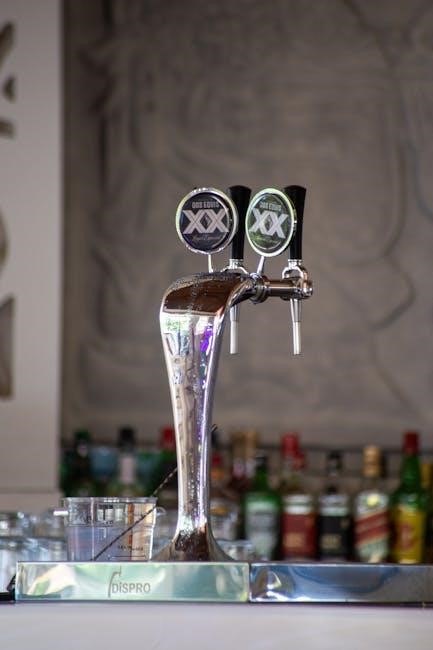
Bartenders play a crucial role in the hospitality industry, ensuring exceptional customer experiences through drink preparation, customer interaction, and maintaining a clean, efficient bar environment.
1.1. Overview of the Bartender Role
A bartender is a multifaceted professional responsible for preparing and serving beverages, managing cash transactions, and maintaining a clean, organized bar environment. They must possess strong interpersonal skills to engage with customers, handle orders efficiently, and ensure a positive experience. Bartenders also play a key role in upselling, managing inventory, and collaborating with other staff. Their responsibilities extend beyond mixing drinks, as they must adhere to safety protocols, manage customer interactions, and maintain a welcoming atmosphere. Effective communication, attention to detail, and the ability to multitask are essential for success in this dynamic role.
1.2. Importance of Bartenders in the Hospitality Industry
Bartenders are integral to the hospitality industry, enhancing customer experiences through exceptional service, drink expertise, and creating a welcoming atmosphere. They significantly contribute to revenue by upselling, managing inventory, and ensuring customer satisfaction. Their role extends beyond serving drinks, as they often act as ambassadors for the establishment, building loyalty and fostering a positive reputation. Bartenders also play a key role in maintaining safety standards, handling difficult situations, and ensuring compliance with regulations, making them indispensable to the smooth operation of bars, restaurants, and hotels.
1.3. Purpose of the Article
This article aims to provide a comprehensive understanding of the duties and responsibilities of bartenders, highlighting their role in hospitality. It serves as a guide for aspiring bartenders, professionals seeking to enhance their skills, and employers looking to understand the expectations of the role. By covering key aspects of bartending, this piece helps readers appreciate the complexity and importance of the profession, offering insights into the skills, knowledge, and practices required to excel in this dynamic and rewarding career path.

Primary Duties of a Bartender
Bartenders are responsible for preparing high-quality beverages, managing cash transactions, and maintaining a clean bar environment to ensure customer satisfaction and efficient service delivery.
2.1. Preparing and Serving Drinks
- Bartenders expertly prepare and serve a variety of beverages, including cocktails, wine, and beer, adhering to recipes and presentation standards.
- They utilize ingredients like spirits, mixers, and garnishes, ensuring quality and consistency in every drink.
- Serving drinks with attention to detail, bartenders aim to enhance the customer experience through visually appealing presentations.
- They also handle special requests, such as custom cocktails or modifications to suit dietary preferences.
- Bartenders ensure compliance with safety guidelines, such as monitoring drink temperatures and avoiding cross-contamination.
- Their role involves upselling premium beverages and making recommendations to increase customer satisfaction and sales.

2.2. Managing Cash Transactions
Bartenders are responsible for handling cash, credit card payments, and mobile transactions accurately. They operate point-of-sale systems, process orders, and ensure correct change is provided. Managing cash floats, balancing tills, and maintaining records of sales are critical tasks; Bartenders must also handle discounts, tips, and refunds while adhering to financial policies. Their role requires attention to detail to prevent errors and ensure secure transactions. Effective cash management is essential for maintaining trust and operational efficiency in the establishment.
2.3. Maintaining the Bar Area
Maintaining the bar area involves cleaning and organizing the space, restocking supplies, and ensuring all equipment is in good working condition. This includes wiping down surfaces, polishing glasses, and arranging bottles and ingredients neatly. Bartenders must also monitor inventory levels, replenish items like napkins and straws, and dispose of waste properly. A well-maintained bar area enhances efficiency, safety, and customer satisfaction, making it a critical part of a bartender’s role.
2.4. Interacting with Customers
Interacting with customers is a vital part of a bartender’s role, requiring strong communication and interpersonal skills. Bartenders greet patrons, understand their preferences, and make tailored drink recommendations. They listen actively, ensuring orders are accurate and delivered promptly. Handling difficult customers with patience and professionalism is essential, as is maintaining a friendly and approachable demeanor. Building rapport with regulars and creating a welcoming atmosphere fosters customer loyalty. Effective interaction enhances the overall dining or social experience, making it a cornerstone of a bartender’s responsibilities.
2.5. Handling Orders and Reservations
Effectively managing orders and reservations is a key responsibility for bartenders, ensuring timely delivery of drinks and accommodations for large groups or special events. This involves coordinating with kitchen staff, servers, and hosts to streamline service, especially during peak hours; Bartenders must also handle reservations, confirming details and arranging seating to maximize efficiency. Strong organizational skills are essential to juggle multiple orders and maintain customer satisfaction, while also addressing any special requests or cancellations promptly and professionally.

Secondary Responsibilities of a Bartender
Beyond serving drinks, bartenders manage inventory, clean equipment, collaborate with staff, and resolve customer complaints, ensuring smooth bar operations and a positive customer experience.
3.1. Inventory Management
Inventory management is a critical responsibility for bartenders, involving tracking stock levels of liquors, mixers, and supplies. This ensures the bar is well-stocked and avoids shortages or overstocking. Bartenders must regularly count supplies, monitor expiration dates, and reorder items as needed. They also manage the budget for inventory, ensuring cost-efficiency and reducing waste. Accurate record-keeping is essential to maintain transparency and prevent discrepancies. Effective inventory management helps the bar operate smoothly, ensuring customer satisfaction and optimizing profitability.
3.2. Cleaning and Sanitizing Equipment
Cleaning and sanitizing equipment is a critical responsibility for bartenders to maintain hygiene and prevent contamination. This includes washing utensils, wiping down surfaces, and ensuring all tools are sterilized. Bartenders must regularly sanitize equipment like shakers, shovels, and shakers to meet health standards. Proper use of cleaning products and techniques is essential to avoid cross-contamination. This task ensures a safe environment for preparing drinks and builds customer trust in the bar’s cleanliness. A clean workspace also enhances efficiency and professionalism, making it a non-negotiable part of a bartender’s routine.
3.3. Collaborating with Other Staff
Bartenders must work seamlessly with other staff, such as waiters, kitchen personnel, and managers, to ensure smooth service. Effective communication and coordination are essential, especially during peak hours. Collaborating on tasks like managing orders, handling special requests, and resolving customer issues fosters a cohesive team environment. Bartenders often assist with tasks outside their primary duties, such as restocking supplies or covering shifts, demonstrating adaptability and teamwork. Strong collaboration enhances overall efficiency, customer satisfaction, and workplace morale, making it a vital part of a bartender’s role.
3.4. Handling Customer Complaints
Bartenders must address customer complaints professionally and efficiently. This involves listening actively, remaining calm, and empathizing with the customer’s concerns. They should assess the issue, offer viable solutions, and ensure the problem is resolved to the customer’s satisfaction. Effective communication and problem-solving skills are essential to maintain customer loyalty and a positive reputation for the establishment. Handling complaints gracefully reflects the bartender’s professionalism and commitment to providing excellent service.
- Active listening and empathy are key.
- Offering solutions promptly maintains trust.
- Resolving issues enhances customer loyalty.

Health and Safety Compliance
Bartenders must adhere to hygiene standards, manage allergies, and prevent over-serving alcohol to ensure a safe environment for customers and comply with legal requirements.
4.1. Adhering to Hygiene Standards
Bartenders must maintain strict hygiene standards to ensure a clean and safe environment for customers. This includes washing hands frequently, sanitizing equipment, and cleaning surfaces regularly. Proper handling of ingredients, such as garnishes and ice, is essential to prevent contamination. Bartenders should also follow proper food safety protocols when preparing drinks, including storing ingredients at correct temperatures. Personal hygiene, such as keeping uniforms clean and wearing gloves when necessary, is equally important. Regular cleaning schedules during and after shifts help maintain a hygienic bar area.
4.2; Managing Allergies and Dietary Restrictions
Bartenders must identify and manage food allergies and dietary restrictions to ensure customer safety and satisfaction. This involves understanding common allergens, such as nuts, dairy, and gluten, and communicating effectively with customers about ingredients. They should also suggest alternative drinks or modifications to accommodate specific needs. Proper labeling and training are essential to prevent cross-contamination and ensure compliance with health standards. By addressing these concerns, bartenders contribute to a safe and inclusive environment, aligning with legal and ethical responsibilities in the hospitality industry.
4.3. Preventing Over-Serving of Alcohol
Preventing over-serving is a critical responsibility of bartenders to ensure customer safety and comply with legal standards. Bartenders must monitor patrons’ alcohol consumption, recognize signs of intoxication, and refuse further service when necessary. This includes checking IDs to verify age, using drink management systems, and maintaining awareness of local alcohol laws. By preventing over-serving, bartenders help protect customers from harm, reduce liability risks for the establishment, and contribute to a responsible and safe drinking environment.

Soft Skills Required for Bartenders
Effective communication, emotional intelligence, and strong time management are essential for bartenders to ensure seamless service, handle stress, and maintain positive customer interactions and workplace harmony.
5.1; Communication Skills
Effective communication is vital for bartenders to understand customer preferences, explain menu items, and handle orders accurately. Clear and friendly interactions create a welcoming atmosphere, fostering customer satisfaction and repeat business. Bartenders must also communicate seamlessly with other staff, such as servers and kitchen teams, to ensure smooth service delivery. Strong verbal and non-verbal skills help in resolving conflicts and addressing feedback professionally. Active listening and adaptability are key to meeting diverse customer needs, ensuring a positive experience for all patrons.
5.2. Emotional Intelligence
Emotional intelligence is crucial for bartenders to manage stress, empathize with customers, and maintain positive interactions. It helps in understanding patron needs, resolving conflicts, and creating a welcoming atmosphere. High emotional intelligence fosters better communication and adaptability, ensuring customer satisfaction and workplace harmony. Bartenders with strong emotional intelligence can navigate diverse personalities and situations effectively, enhancing overall service quality and team collaboration.
5.3. Time Management
Effective time management is essential for bartenders to handle multiple tasks efficiently. Juggling drink orders, cash transactions, and customer interactions simultaneously requires strong organizational skills. Bartenders must prioritize tasks, such as preparing drinks quickly while maintaining quality, to ensure fast service even during peak hours. Good time management helps prevent delays, reduces stress, and enhances customer satisfaction. It also allows bartenders to maintain a clean and organized workspace, contributing to the overall efficiency of the bar. Strong time management skills are crucial for providing excellent service and ensuring smooth bar operations.

Work Environment for Bartenders
Bartenders work in dynamic, fast-paced settings, including restaurants, bars, hotels, and event venues, often standing for long periods and handling multiple tasks simultaneously in a team environment.
6.1. Types of Work Settings
Bartenders work in diverse environments, including restaurants, bars, hotels, nightclubs, and pubs. They may also be employed in upscale cocktail lounges, private event spaces, or on cruise ships. Some bartenders specialize in high-volume settings like stadiums or resorts, while others prefer intimate, craft-focused bars. The work setting often dictates the pace, atmosphere, and level of interaction with customers, requiring adaptability and flexibility. Each environment presents unique challenges and opportunities for bartenders to showcase their skills and provide exceptional service.
6.2. Physical Demands of the Job
Bartending is a physically demanding job requiring long hours on your feet, frequent lifting of heavy objects like bottles or kegs, and repetitive motions. Stamina is essential to manage busy shifts, while manual dexterity is needed for tasks like mixing drinks or handling cash. The job also involves working in a fast-paced, sometimes hot environment. Bartenders must have the physical endurance to maintain efficiency and safety throughout their shift, balancing customer service with the physical aspects of the role.

Tools and Equipment Used by Bartenders
Bartenders rely on tools like jiggers, muddlers, shakers, blenders, citrus juicers, bar spoons, and hawthorne strainers to craft and serve drinks efficiently and effectively.
7.1. Essential Bar Tools
Essential bar tools include shakers, jiggers, muddlers, strainers, and bar spoons. These tools help bartenders prepare cocktails efficiently. Shakers mix ingredients, while jiggers measure precise amounts. Muddlers crush fruits and herbs, strainers filter ice, and bar spoons stir drinks.
Education and Training
Bartenders often benefit from formal education or workshops, learning drink preparation, mixology, and customer service skills to excel in their roles.
8.1. Certifications and Courses
Obtaining certifications like TIPS (Training for Intervention ProcedureS) or BarSmarts enhances a bartender’s expertise in alcohol safety and mixology. These programs teach essential skills for responsible serving and drink preparation.
Online courses on platforms like Coursera or Udemy offer in-depth training in cocktail crafting, wine knowledge, and customer service. These resources help bartenders refine their craft and stay updated on industry trends.
Certifications not only improve job prospects but also demonstrate a commitment to professionalism and continuous learning in the bartending profession.

Career Growth and Opportunities

Bartenders can advance to roles like bar manager or mixologist, with opportunities to specialize in craft cocktails, own a bar, or work in hospitality leadership.
9.1. Advancement in the Industry
Bartenders can advance their careers by gaining experience and enhancing their mixology skills, leading to promotions as senior bartenders or bar managers. Specializing in craft cocktails or becoming a mixologist offers creative and lucrative opportunities. Some may venture into entrepreneurship by opening their own bars or launching spirit brands. Continuous learning through certifications and staying updated on industry trends are essential for growth. Networking and building a reputable presence in the industry can unlock advanced roles and recognition, such as participating in competitions or receiving prestigious awards, further solidifying their expertise.